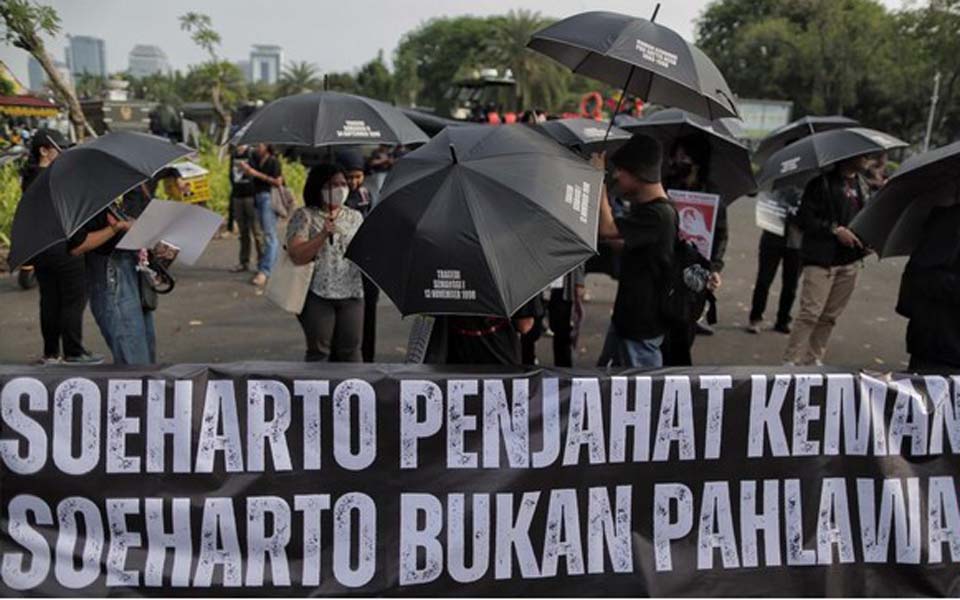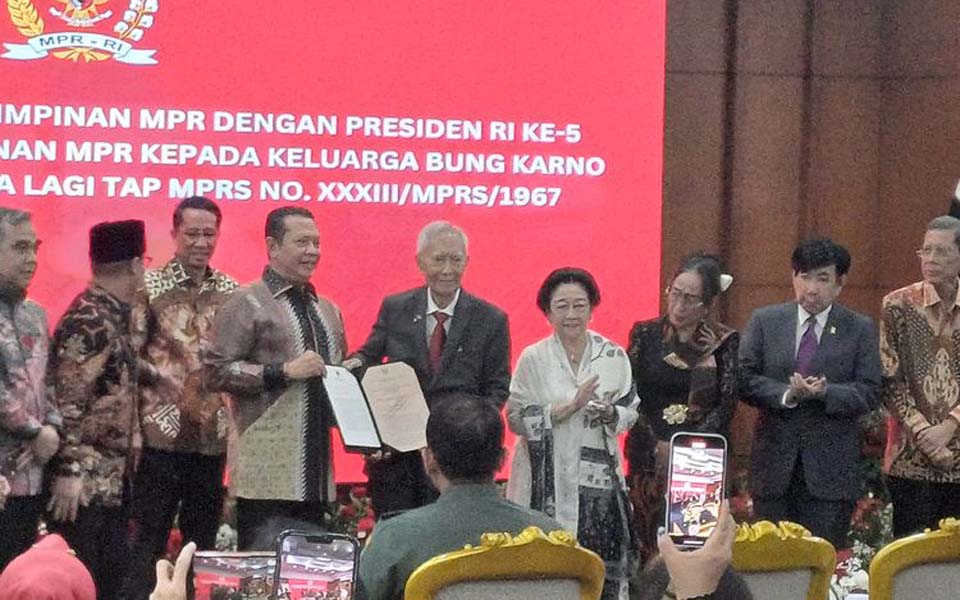Jakarta – Another hammer-and-sickle flag case has again raised its head after a flag with the communist logo was found in Makassar. Over the years such cases have occurred unintentionally, have related to scholarly studies, hoaxes intended to trigger unrests, criminalisation of activists and the revival of identity politics.
The ban on communist ideas and its logo are embodied in Provisional People’s Consultative Assembly Decree (TAP MPRS) Number XXV/MPRS/1966 on the Dissolution of the Indonesian Communist Party (PKI) and Prohibitions on Communist, Marxist and Leninist Teachings.
The latest case involves the discovery of a red-and-white flag with a hammer-and-sickle logo at the Hasanuddin University (Unhas) in the South Sulawesi provincial capital of Makassar in late April. The police have already questioned several witnesses over the case.
One of them is Unhas Deputy Rector for Student Affairs Arsunan Arsin who first ordered the flag to be taken down. Police are still investigating.
This is not the first time logos or hammer-and-sickle symbols had been found in Indonesia. Police have investigated several cases of the logo which is closely linked to communism.
In 2015, two Jember State University students in East Java were detained by police because they draw a picture of a hammer-and-sickle on a campus wall.
According to police, the students drew communist symbols on a dentistry faculty wall on Jl. Mastrip, a Jember State University Student Creativity Program (PKM) building and 20 other walls.
After being questioned by police the two claimed that they had no intention of promoting communist ideology through the pictures. They were subsequently released but required to report regularly to police.
In 2016 a joint team of police and TNI (Indonesian military) personnel detained a shop owner for selling T-shirts with pictures of the hammer-and-sickle. The owner of the shop – located at Block M in South Jakarta – was subsequently taken to the Kebayoran Baru sectoral police (police intelligence) for questioning.
Based on the questioning, police did not find any indications of makar (treason, subversion, rebellion) in the sale of the T-shirts. The shop owner, said police, claimed he did not know anything about the matter and said that no T-shirts had been bought since they went on sale.
In the same year officers from the Tanah Abang sectoral police sized six books with hammer-and-sickle logos on the covers during a book show at the Jakarta Convention Center in Senayan, Central Jakarta. After being investigated, it was found that the books were printed by a publisher from Malaysia.
In 2017, Islamic Defenders Front (FPI) leader Rizieq Shihab was reported to the Metro Jaya regional police in relation to a speech he gave on bank notes with the hammer-and-sickle symbol on them.
Shihab was then reported by a social organisation calling itself the Anti-Slander Youth Network (JIMAF) because his speech was deemed as being divisive.
Bank Indonesia (BI), the institution which issued the bank notes, made a clarification of the logo deemed to be a hammer-and-sickle. The BI logo which Shihab claimed resembled a hammer-and-sickle was a security measure utilising rechtoverso technology aimed at making it difficult to counterfeit.
In the same year an environmental activist named Heri Budiawan alias Budi Pego was arrested on charges of putting up a banner with a picture resembling the hammer-and-sickle during a protest against a mine which had damaged the environment at Salak Mountain in Banyuwangi, East Java.
As a consequence, Budiawan was found guilty of committing a crime against the state by the Banyuwangi District Court and sentenced to 10 months in prison. The Supreme Court subsequently upheld the verdict and increased his sentence to four years jail.
According to the Institute for Criminal Justice Reform (ICJR), there were many weaknesses in the verdict. A video recording presented as evidence in court was not professionally verified. Budiawan was seen as a victim of criminalisation.
In 2019 the Jambi municipal police in West Sumatra sized a number of children’s toys from a shopping centre because they allegedly had hammer-and-sickle logos on them.
The toys were souvenirs which could be exchanged for coupons. Based on the findings, the police summoned the seller and mall management for questioning.
Hammer-and-sickle logo cases – which are equated with communism and the PKI – keep being revived by certain groups at crucial moments such as presidential elections and now during the corona virus pandemic. This time round, the issue been revived in relation to the Draft Law on Pancasila Ideology Guidelines (RUU HIP).
Political observer Arie Sudjito from the Gajah Mada University (UGM) in Yogyakarta believes that the communist issue – which continues to be revived each year – is no longer relevant. This is because communism, particularly the PKI, is no longer developing in Indonesia.
“The fact is that it would be impossible for the PKI to grow, because it has already been consigned to history. And in several countries around the world communism is no longer the ideological choice”, said Sudjito when contacted by CNN Indonesia on Monday October 1, 2019.
Sudjito said that the public must be on guard against the old political elite who try to manipulate identity issues such as the revival of communism to achieve their political goals.
“So this must be watched out for, not the reproduction of the PKI ghost but the reproduction of [former] New Order [groups]”, he said referring to former president Suharto’s New Order regime.
Indonesian Human Rights Watch (Imparsial) Deputy Director Gufron Mabruri believes that the PKI issue will continue to be taken advantage of by certain groups each year unless the government is prepared to reveal the truth behind the 1965 tragedy. (dis/arh)
[Translated by James Balowski. The original title of the article was “Naik-Turun Kasus Palu Arit, Isu Komunisme yang Tak Tuntas”.]















